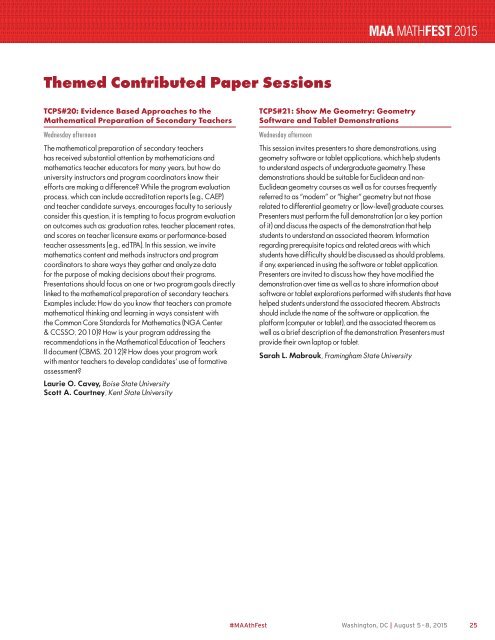MAA MATHFEST 2015Themed Contributed Paper Sessions (continued)TCPS#16: Curriculum Development to Support FirstYear General Education Mathematics StudentsWednesday afternoonA common focus of university administration is studentretention and graduation. First year mathematics coursesremedialand general education- have relatively high drop/fail/withdraw rates, which place them under scrutiny byadministration. In this session, we would like to hear whatyou have been doing to improve pass rates and studentpersistence in first year courses with traditionally high DFWrates. We hope to focus on department efforts (rather thanspecific classroom approaches) to support students in thesefirst year Mathematics courses. Presentations could includecomplete multi-section redesign, restructure of curriculum,efforts to standardize. We would like to hear about successful,in progress, and unsuccessful efforts. Presentations with adescription of the initiative along with data supporting thesuccess or failure are encouraged.Donna Flint, South Dakota State UniversityCharles Bingen, University of Wisconsin Eau ClaireTCPS#17: Curriculum and Course Development toSupport First Year STEM StudentsFriday afternoonPoor retention in the STEM fields is often tied to students’ initialdifficulties and/or lack of motivation in mathematics coursesearly in their academic career. In this session, we would liketo hear about efforts to help struggling students in first yearmathematics courses for STEM students or to help motivatestudents in these courses. We are particularly interested indepartmental efforts, rather than specific classroom teachingactivities. We would like to hear about successful, in progress,and unsuccessful efforts. Presentations with a description ofthe initiative along with data supporting the success or failureare encouraged.Donna Flint, South Dakota State UniversityDan Kemp, South Dakota State UniversityCharles Bingen, University of Wisconsin Eau ClaireTCPS#18: Using Modeling for Teaching DifferentialEquations: Before, During, AfterSaturday afternoonOften modeling is associated with differential equationscourses as a motivator for learning and as a way of showinghow mathematics is applied in other disciplines such asphysics, biology, and economics. Modeling can be used (1)as a way of leading up to the mathematics being taught, (2)during the instruction on the mathematics and techniques,and/or (3) after the mathematics has been taught. These threetimes—before, during, or after—for using modeling have thepotential to support students and motivate their learning. Weinvite colleagues who use modeling, especially with real data,to share their experiences with special attention paid to thetiming of the modeling activities with respect to associateddifferential equations concepts and techniques. This sessionis sponsored by SIMIODE - Systemic Initiative for ModelingInvestigations and Opportunities with Differential Equationsand presenters will be invited to submit their modelingscenarios for peer-reviewed publication at www.simiode.org.Brian Winkel, United States Military AcademyKaren Bliss, Quinnipiac UniversityJessica Libertini, Virginia Military InstituteNakeya Williams, United States Military AcademyTCPS#19: Innovative Approaches in the CalculusSequenceFriday and Saturday afternoonsThere has been a significant amount of investigation intothe flaws of traditional <strong>calculus</strong> courses and possibleimprovements, from the Calculus Reform movement beginningin the late 1980s to the recent MAA study finding significantattrition during the <strong>calculus</strong> sequence. This session shinesa spotlight on recent efforts from instructors to make aproductive change. In this session, we ask instructors to sharecreative ideas for instruction from the <strong>calculus</strong> sequence.We are interested in general approaches and/or specificactivities that a) help students engage in the mathematics of<strong>calculus</strong> in innovative ways and/or b) promote group workand conversation about the mathematical content. Submittedabstracts should include a description of the approach/activity, how it meets these objectives, and observed strengthsand weaknesses compared with the traditional approach. Weencourage presentations in which the audience can experiencethe innovative teaching and learning.Aaron Wangberg, Winona State UniversityBrian Fisher, Lubbock Christian UniversityJason Samuels, City University of New York24 Washington, DC | August 5–8, 2015 #MAAthFest
MAA MATHFEST 2015Themed Contributed Paper SessionsTCPS#20: Evidence Based Approaches to theMathematical Preparation of Secondary TeachersWednesday afternoonThe mathematical preparation of secondary teachershas received substantial attention by mathematicians andmathematics teacher educators for many years, but how douniversity instructors and program coordinators know theirefforts are making a difference? While the program evaluationprocess, which can include accreditation reports (e.g., CAEP)and teacher candidate surveys, encourages faculty to seriouslyconsider this question, it is tempting to focus program evaluationon outcomes such as: graduation rates, teacher placement rates,and scores on teacher licensure exams or performance-basedteacher assessments (e.g., edTPA). In this session, we invitemathematics content and methods instructors and programcoordinators to share ways they gather and analyze datafor the purpose of making decisions about their programs.Presentations should focus on one or two program goals directlylinked to the mathematical preparation of secondary teachers.Examples include: How do you know that teachers can promotemathematical thinking and learning in ways consistent withthe Common Core Standards for Mathematics (NGA Center& CCSSO, 2010)? How is your program addressing therecommendations in the Mathematical Education of TeachersII document (CBMS, 2012)? How does your program workwith mentor teachers to develop candidates’ use of formativeassessment?Laurie O. Cavey, Boise State UniversityScott A. Courtney, Kent State UniversityTCPS#21: Show Me Geometry: GeometrySoftware and Tablet DemonstrationsWednesday afternoonThis session invites presenters to share demonstrations, usinggeometry software or tablet applications, which help studentsto understand aspects of undergraduate geometry. Thesedemonstrations should be suitable for Euclidean and non-Euclidean geometry courses as well as for courses frequentlyreferred to as “modern” or “higher” geometry but not thoserelated to differential geometry or (low-level) graduate courses.Presenters must perform the full demonstration (or a key portionof it) and discuss the aspects of the demonstration that helpstudents to understand an associated theorem. Informationregarding prerequisite topics and related areas with whichstudents have difficulty should be discussed as should problems,if any, experienced in using the software or tablet application.Presenters are invited to discuss how they have modified thedemonstration over time as well as to share information aboutsoftware or tablet explorations performed with students that havehelped students understand the associated theorem. Abstractsshould include the name of the software or application, theplatform (computer or tablet), and the associated theorem aswell as a brief description of the demonstration. Presenters mustprovide their own laptop or tablet.Sarah L. Mabrouk, Framingham State University#MAAthFestWashington, DC | August 5–8, 2015 25


